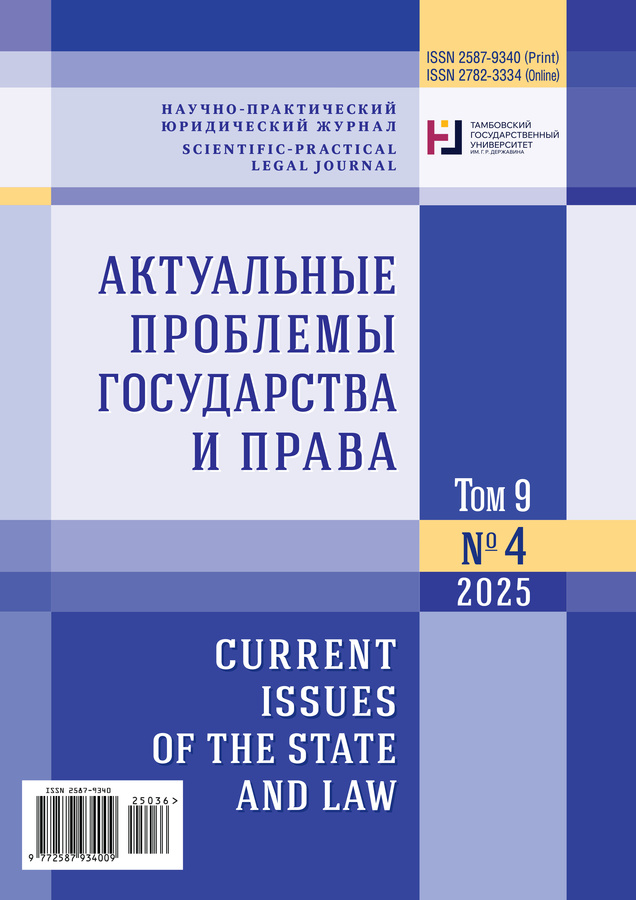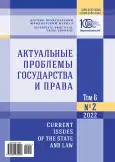Правовые последствия Брекзита для регионов Великобритании и теоретические основы правовых механизмов предотвращения сецессии
- Авторы: КОДАНЕВА С.И.1
-
Учреждения:
- Институт научной информации по общественным наукам РАН (ИНИОН РАН)
- Выпуск: Том 6, № 2 (2022)
- Страницы: 140-150
- Раздел: Общая теория и история права и государства
- URL: https://journal-vniispk.ru/2587-9340/article/view/303754
- ID: 303754
Цитировать
Аннотация
Введение. Показано, что, по мере роста числа этно-национальных конфликтов практически во всех частях света процессы сецессии становятся все более популярными. При этом правовые и политические механизмы предотвращения сецессии могут кардинально различаться в зависимости от национальных особенностей. Но и те механизмы, которые показывали свою эффективность на протяжении длительного периода, при определенных (кризисных) условиях перестают работать, заставляя государства искать новые инструменты предотвращения сецессии своих регионов. Цель и задачи исследования. Целью исследования является изучение опыта предотвращения сецессии национальных регионов Великобритании в процессе выхода из Евросоюза. Утверждается, что жесткие инструменты ограничения автономии регионов не только не были эффективны, но повысили риск распада страны. Поставлена задача анализа изменения региональной политики Великобритании в процессе Брекзита. Методология. Использована методологическая модель А. Липхарта, классический подход А.В. Дайси к определению парламентского суверенитета. Также использованы общенаучные методы обобщения и системного анализа. Результаты исследования. Доказано, что сложившиеся ранее механизмы предотвращения сецессии оказались недостаточными, а жесткие инструменты предотвращения сецессии в кризисных условиях выхода Великобритании из ЕС – неэффективными и, напротив, стимулировали сепаратистские настроения в национальных регионах страны. Вывод. Сделан вывод о том, что только использование гибких форм взаимодействия и формирование новых инструментов партнерства позволило избежать сецессии регионов. Для этого потребовалась выработка новых правовых и политических инструментов взаимодействия и сотрудничества между центральной властью и местными элитами.
Ключевые слова
Об авторах
Светлана Игоревна КОДАНЕВА
Институт научной информации по общественным наукам РАН (ИНИОН РАН)
Автор, ответственный за переписку.
Email: kodanevas@gmail.com
ORCID iD: 0000-0002-8232-9533
кандидат юридический наук, ведущий научный сотрудник
Российская Федерация, 117218 г. Москва, ул. Кржижановского, 15, к. 2Список литературы
- Miro D., Woertz E. (eds.) Secession and Counter-secession an International Relations Perspective. Barcelona: CIDOB, 2018. 108 р. URL: www.cidob.org/en/publications/publication_series/monographs/mono-graphs/secession_and_counter_secession_an_international_relations_perspective (accessed: 19.02.2022).
- Хащина Э.Э. Значение правовых позиций международных и внутригосударственных органов для предотвращения сецессии: теоретико-исторический анализ // Актуальные проблемы государства и права. 2021. Т. 5. № 19. С. 438-453. doi: 10.20310/2587-9340-2021-5-19-438-453
- Андреева Г.Н., Хащина Э.Э. Международно-правовые механизмы предотвращения сецессии // Междуна-родное публичное и частное право. 2021. № 6. С. 21-24. doi: 10.18572/1812-3910-2021-6-21-24
- Андреева Г.Н. Двойные стандарты в отношении современных государств к сецессии: правовой аспект // Контуры глобальных трансформаций: политика, экономика, право. 2021. Т. 14. № 1. С. 6-22. doi: 10.23932/2542-0240-2021-14-1-1
- Гинзбург Ю.В. Автономия как способ предотвращения сецессии: опыт Гренландии (историко-юридический аспект) // Историко-правовые проблемы: Новый ракурс. 2021. № 3. С. 22-30.
- Tierney S. The territorial constitution and the Brexit process // Current Legal Problems. 2019. Vol. 72. № 1. Р. 59-83. doi: 10.1093/clp/cuz007
- Lijphart А. Patterns of Democracy: Government Forms and Performance in Thirty-Six Countries (2nd edn). New Haven; London: Yale University Press, 2012. 368 р.
- Dicey A.V. Introduction to the Study of the Law of the Constitution. Indianapolis, Indiana: Liberty Fund Inc., 1982. 584 р. URL: files.libertyfund.org/files/1714/0125_Bk.pdf (accessed: 19.02.2022).
- Reid С.T. Brexit and the devolution dynamics // Environmental Law Review. 2017. Vol. 19. № 1. Р. 3-5. doi: 10.1177/1461452917693337
- McHarg A. Navigating without maps: Constitutional silence and the management of the Brexit crisis // Interna-tional Journal of Constitution Law. 2018. Vol. 16. № 3. P. 952-968. doi: 10.1093/icon/moy068
- Bell D.N.F. Regional aid policies after Brexit // Oxford Review of Economic Policy. 2017. Vol. 33. № 1. Р. 91-104. doi: 10.1093/oxrep/grx019
- Андреева Г.Н., Гинзбург Ю.В. Проблемы правового регулирования финансовых вопросов предотвраще-ния сецессии в контексте территориального устройства // Финансовое право. 2020. № 12. С. 3-6. doi: 10.18572/1813-1220-2020-12-3-6
- Giordano B. Post-Brexit regional economic development policy in the UK? Some enduring lessons from Euro-pean Union Cohesion Policy // European Urban and Regional Studies. 2021. Vol. 28. № 1. Р. 26-33. doi: 10.1177/0969776420970624.
- Cavendish. C Boris Johnson’s ‘levelling up’ agenda depends on devolving power // The Financial Times. 2020. March 7. URL: www.ft.com/content/db51cd3c-5f05-11ea-8033-fa40a0d65a98 (accessed: 19.02.2022).
- Охошин О.В. Последствия Брекзита для Уэльса // Научно-аналитический вестник ИЕ РАН. 2021. № 6. С. 104-111. doi: 10.15211/vestnikieran62021104111
Дополнительные файлы









